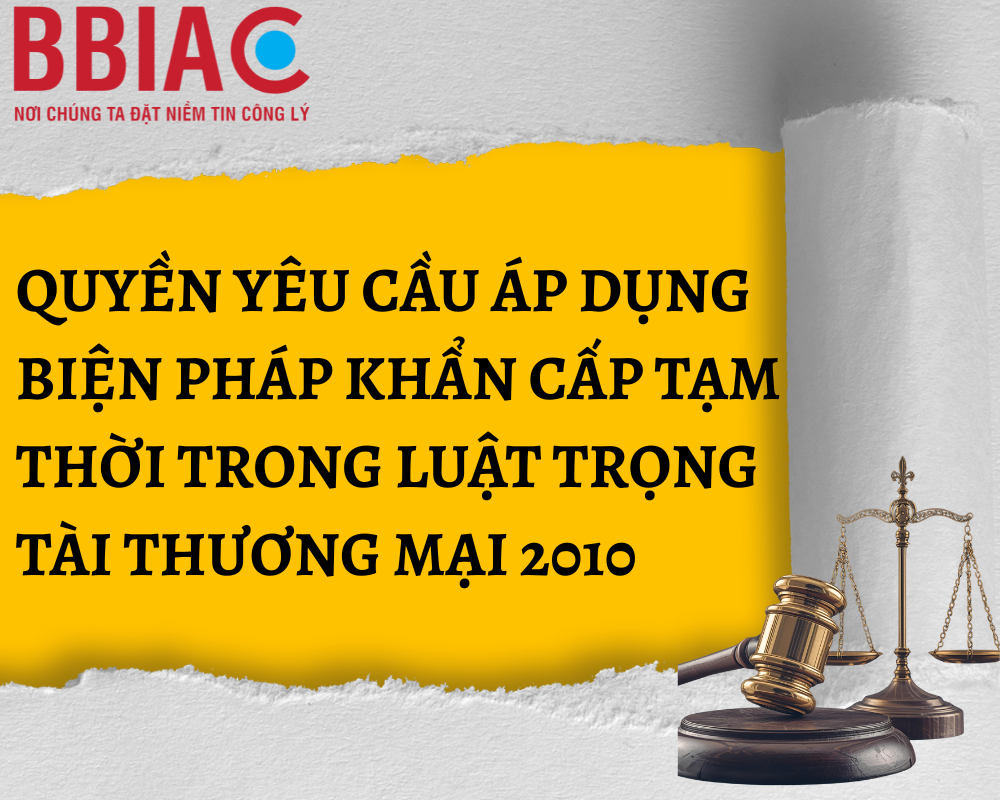The right to request the application of provisional emergency measures under the 2010 Law on Commercial Arbitration

1. Overview of the Issue
The choice to use arbitration as a method for resolving commercial disputes has gradually become more common among Vietnamese enterprises, as arbitral proceedings provide advantages in terms of flexibility, expeditious resolution, transparency, and fairness. Along with this is the continuous development of Arbitration Centers in both professional capacity and specialized expertise, as well as the proficiency of arbitrators.
In addition, acquiring knowledge to enhance the understanding of arbitration among consumers, including individuals and enterprises engaged in commercial activities, is essential so that they may know how to select and effectively utilize arbitral proceedings for dispute resolution.
Based on the provisions of the 2015 Civil Procedure Code, the nature of provisional emergency measures is that they serve as tools for disputing parties to temporarily protect their rights and interests until the case is fully resolved. Readers may be interested in better understanding the legal framework and regulations concerning the right to request the application of provisional emergency measures in arbitral proceedings, as prescribed in the 2010 Law on Commercial Arbitration. The following are several clarifications on this issue.
2. Legal provisions on the right to request the application of provisional emergency measures
According to Article 48 of the Law on Commercial Arbitration 2010, the right to request the application of provisional emergency measures is provided as follows:
“1. The disputing parties have the right to request the Arbitral Tribunal or the Court to apply provisional emergency measures in accordance with this Law and other relevant laws, unless otherwise agreed by the parties.
2. A request to the Court for the application of provisional emergency measures shall not be regarded as a waiver of the arbitration agreement or a refusal to resolve the dispute by arbitration.”
Accordingly, the party entitled to request the application of provisional emergency measures is one of the disputing parties. During arbitral proceedings, if a party finds it necessary to protect evidence, assets, or rights and interests that, if not protected, may cause serious and irreparable damage, such party has the right to make the request either together with the statement of claim or during the process of dispute resolution in order to safeguard its legitimate rights and interests. The urgent needs for requesting the application of provisional emergency measures can be clarified depending on each specific situation as follows:
- Protection of evidence: Applied when evidence is being destroyed, is at risk of being destroyed, or when there are acts obstructing the collection or assessment of evidence.
- Preservation of the current status: To prevent serious consequences that may occur, such as disputes over assets, requiring the maintenance of the current state to avoid irreparable damage.
- Addressing urgent requests of the disputing parties: Applied when it is necessary to promptly resolve issues directly affecting the life, health, or safety of the involved parties, for example requests for alimony or salary advances.
- Ensuring enforcement of the arbitral award: Measures may be applied to secure future enforcement, such as prohibiting the transfer of assets or freezing bank accounts.
3. Provisional urgent measures under the current regulations
According to Clause 2, Article 49 of the Law on Commercial Arbitration, the provisional urgent measures are listed as follows:
“(a) Prohibiting any change to the current status of the disputed property;
(b) Prohibiting or compelling any disputing party to perform one or several acts in order to prevent conduct that may adversely affect the arbitral proceedings;
(c) Seizing the disputed property;
(d) Requiring the preservation, storage, sale, or disposal of any property of one or more disputing parties;
(đ) Temporarily requiring payment between the parties;
(e) Prohibiting the transfer of ownership rights over the disputed property.”
4. On the procedure for the application of provisional emergency measures by the Arbitral Tribunal
Article 50 of the 2010 Law on Commercial Arbitration provides for the procedure for the application of provisional emergency measures by the Arbitral Tribunal as follows:
- The party requesting the application of a provisional emergency measure must submit a petition to the Arbitral Tribunal.
- The petition requesting the application of a provisional emergency measure must contain the following principal details:
(a) Date, month, and year of the petition;
(b) Name and address of the party requesting the application of the provisional emergency measure;
(c) Name and address of the party against whom the provisional emergency measure is requested;
(d) Summary of the dispute;
(đ) Reasons for requesting the application of the provisional emergency measure;
(e) The provisional emergency measure requested and the specific requirements.
The petition requesting the application of a provisional emergency measure must be accompanied by evidence proving the necessity of such measure.
- As decided by the Arbitral Tribunal, the requesting party must provide an amount of money, precious metals, gemstones, or valuable papers as determined by the Arbitral Tribunal, corresponding to the potential damages that may arise in case the provisional emergency measure is improperly applied, in order to protect the interests of the party against whom the measure is requested. Such amount, precious metals, gemstones, or valuable papers shall be deposited into a blocked account at a bank designated by the Arbitral Tribunal.
- Within 03 working days from the date of receipt of the petition, and immediately after the requesting party has fulfilled the security requirement stipulated in Clause 3 of this Article, the Arbitral Tribunal shall consider and issue a decision on the application of the provisional emergency measure. In case the request is rejected, the Arbitral Tribunal shall notify the requesting party in writing and state the reasons.
- The enforcement of the decision on the application of the provisional emergency measure rendered by the Arbitral Tribunal shall be carried out in accordance with the law on civil judgment enforcement.
5. Mechanisms for Resolving Disputes through the Bigboss International Arbitration Center (BBIAC)
To resolve a dispute through commercial arbitration at BBIAC, clients may insert one of the following two clauses into their contracts:
5.1. Model Arbitration Clause
“Any dispute arising out of or in connection with this contract shall be settled by arbitration at the BIGBOSS International Commercial Arbitration Center (BBIAC) in accordance with the Arbitration Rules of Procedure of this Center.”
Additionally, the parties may supplement the clause with:
(a) The number of arbitrators shall be [one or three].
(b) The seat of arbitration shall be [city and/or country].
(c) The governing law of the contract shall be [ ].*
(d) The language of the arbitration shall be [ ].**
Notes:
* Applicable only to disputes involving a foreign element.
** Applicable only to disputes involving a foreign element or disputes where at least one party is an enterprise with foreign invested capital.
5.2. Model Arbitration Clause Applicable to Expedited Procedure
“Any dispute arising out of or in connection with this contract shall be settled by arbitration at the BIGBOSS International Commercial Arbitration Center (BBIAC) in accordance with the Arbitration Rules of Procedure of this Center. The Parties agree that the arbitration proceedings shall be conducted under the Expedited Procedure stipulated in Article 37 of the BBIAC Arbitration Rules of Procedure.”
Additionally, the parties may supplement the clause with:
(a) The seat of arbitration shall be [city and/or country].
(b) The governing law of the contract shall be [ ].*
(c) The language of the arbitration shall be [ ].**
Notes:
* Applicable only to disputes involving a foreign element.
** Applicable only to disputes involving a foreign element or disputes where at least one party is an enterprise with foreign invested capital.
Contact 0979 133 955 for consultation!
